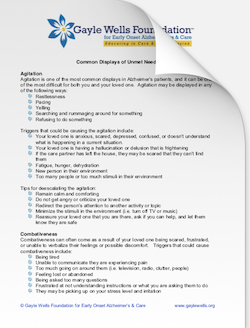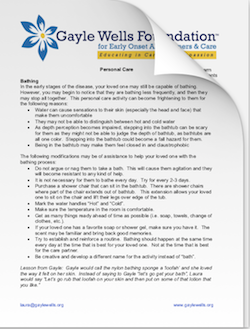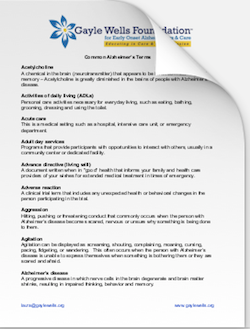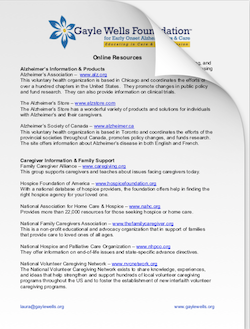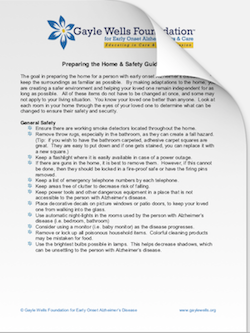
Caring for Someone with Early Onset Alzheimer's
Activities
The person with early onset Alzheimer’s disease is in the prime of their life. They are, or have been, active in the workforce, raising their children, physically active, and capable of making daily decisions. One of the resounding comments from individuals with early onset Alzheimer’s is that they still need to be active and to do things that are productive. Let them do activities to the best of their ability. Activities and tasks will need to be modified as the disease progresses, but let them be active and involved in activities around the house and outdoor activities.
Activities and daily tasks should be purposeful and incorporated in your daily schedule. Consider the following questions when planning activities with your loved one:
- What abilities and skills do they have?
- What activities have they always enjoyed doing?
- Do they have any physical limitations?
- How much supervision do they currently need?
Music, art, and pets can have a positive impact on you and your loved one. Art allows your loved one to be expressive, as well as providing a project that is theirs that they can take pride in. Research has shown that pets can significantly reduce depression and boost self-esteem in the individual with Alzheimer’s disease. Pets can also enhance your loved one’s connection to their world.
Common Displays of Unmet Needs (Behaviors)
As the disease progresses in your loved one, places and actions can become unfamiliar and frightening. Actions may be taken, without explanation of what is being done, and this can cause great unrest and insecurity to your loved one. While your loved one has a progressive brain disease, and communication can become more challenging, it is still critical to explain and converse with your loved one. When this is not done, displays of unmet needs can become more common.
As stressful as these times can be, please remember that your loved one is not being difficult on purpose. Some of the displays can be a result of changes in their brain chemistry and often times the displays of unmet needs are ways of communicating that something is bothering them. Try not to get angry or frustrated, but instead look for the triggering event to ease the situation.
We have created a document that discuses characteristics, possible triggers, and tips for deescalating the following displays of unmet needs: agitation, combativeness, hallucinations, hoarding items, shadowing, sundowning & sleep issues, suspicions, and wandering. Click here to access Common Displays of Unmet Needs.
Personal Care Assistance
Changes in your loved one’s personal care routine may have been noticed long before you received the diagnosis of early onset Alzheimer’s disease. Maybe they don’t brush their teeth as often or don’t bathe/shower as frequently. You may keep insisting that they do these things and struggle with their resistance.
Activities will begin taking longer and longer to complete. The best thing to realize is to not be on a timetable. If you do have to be somewhere at a specific time, then help your loved one start the needed activities early. Rushing them and telling them to “hurry up” is only going to cause frustration and agitation.
The most important advice is this….even though your loved one is changing through this disease process, you still know their inner being better than anyone. Pay attention to what works and doesn’t work and be open to modifying when and how these activities get done.
Please click here to access Personal Care Assistance which contains tips and suggestions on bathing, dressing, grooming, and other personal care needs.
Resources for the Care Partner
The Gayle Wells Foundation for Early Onset Alzheimer’s & Care has compiled several documents that you can utilize for situations you may encounter during the course of the disease.
Alzheimer’s Terms – as you navigate through this disease, you will hear many terms from healthcare and support professionals that may be unfamiliar. This document contains terms related to the many aspects associated with Alzheimer’s disease. Please click here to access Common Alzheimer’s Terminology.
Online Resources – This document contains a list of websites for various agencies and organizations that focus on Alzheimer’s, caregiver resources, and financial and estate planning. Please click here to access Online Resources.
Safety Concerns & Tips
Safety at home is of paramount importance for your loved one, as well as for you as the care partner. They are so many considerations when looking at potential risks within the home, so we’ve compiled the information into the following two documents:
Preparation of Home & Safety Guidelines
Driving, Medications & Medic Alert + Safe Return

